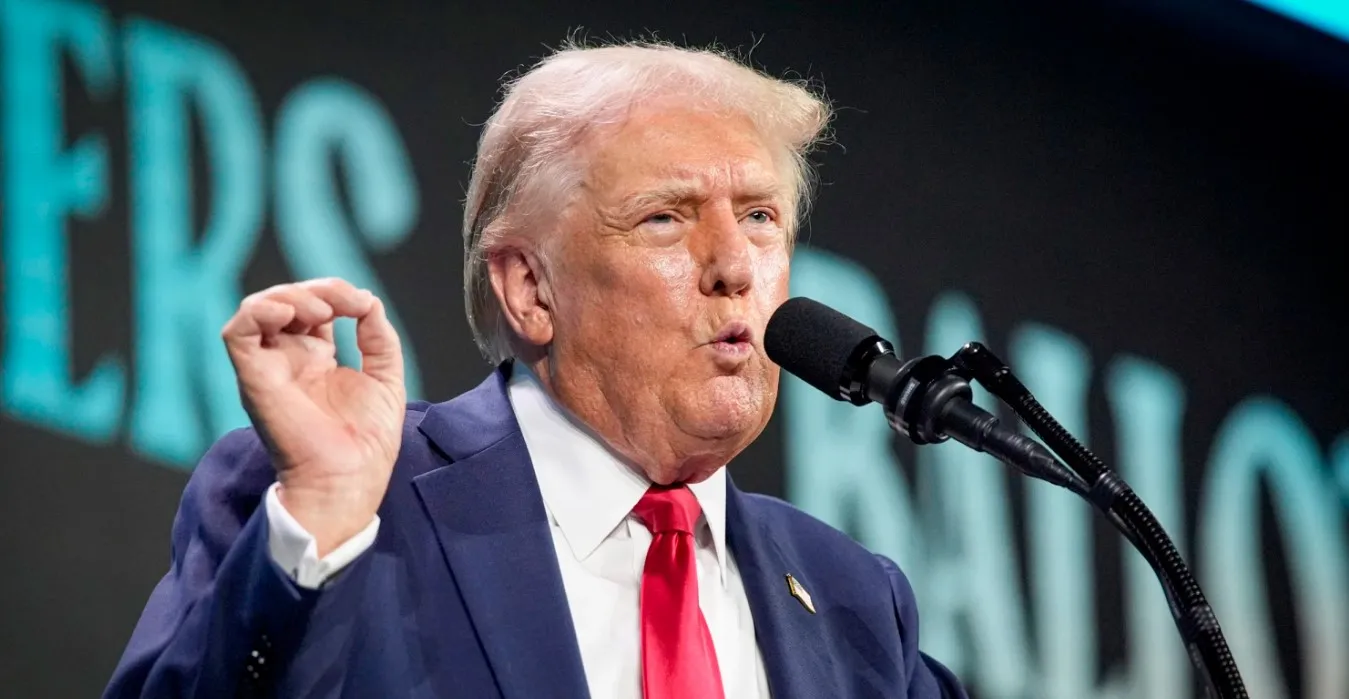Jonathan Martin is POLITICO’s senior political columnist and politics bureau chief. He’s covered elections in every corner of America and co-authored a best-selling book about Donald Trump and Joe Biden. His reported column chronicles the inside conversations and major trends shaping U.S. politics.
CHICAGO — Democrats arrive here, a city that’s played host to so many drama-filled political conventions, as a party lacking in drama. They are disciplined, orderly and united around Vice President Kamala Harris and, more to the point, thwarting former President Donald Trump’s restoration.
This new era of good feelings for Democrats is a far cry from last month, when they faced their most existential crisis since Trump’s initial election, their leaders staring one another down in a sort of political version of nuclear brinksmanship. And it differs from so many previous conventions when there was often intra-party tension over policy, politics, personnel, or all three, looming above the proceedings.
Yes, there will still be protests over the Middle East, an issue that threatens the Democrats’ fragile coalition and electoral map.
However, as the convention gets underway the larger and more consequential story is what the party has become — and how they differ from Republicans.
Democrats are a healthier, better organized, more hierarchical and even ruthless party. Unified against Trump more than they are dedicated to any ideological project, they’ve adopted what’s effectively an Al Davis platform: Just win, baby.
President Biden is finally going to give in? Get in line behind Harris — now.

The vice president is discarding her now-inconvenient left-wing proposals from her 2020 primary bid and airing tough-on the-border ads? Nod.
She’s inviting a cast of Obama-era Democratic consultants onto the campaign she inherited from Biden? Salute.
Bill Clinton’s old saw that Democrats fall in love while Republicans fall in line has been reversed.
Now, let’s stipulate right at the start this doesn’t mean Harris is sure to prevail in November. Her challenges and those of the party remain: The country is still divided, the Electoral College creates structural difficulties, voters are unhappy with the party in power and her past positions, race and gender offer the GOP fodder.
As David Axelrod, the longtime Democratic strategist puts it, the Great Summer Swap of 2024 only handed the party a chance to compete — it hardly guaranteed victory. Happy Days aren’t here again just yet.
That Democrats made such a wrenching decision, though, illuminates a crucial distinction between the parties.
Saddled with an aging and unpopular incumbent president, Democrats used President Biden’s disastrous debate performance to stage what was effectively a front-bench putsch. Orchestrated by other party leaders, Biden’s ouster revealed how pragmatic, cold-eyed and unsentimental Democrats have become in the age of Trump.
The sitting president was their vessel — and no criticism was brooked — until 9:30PM on June 27, when it at last was undeniable to so many Democrats that Biden had become something else: Trump’s enabler.
After so many years in which our British cousins have adopted American political tactics, Democrats finally took a page from Westminster. When prime ministers struggle or become impediments to the party’s success, their colleagues abandon them or pressure them until they step down. It’s not personal, it’s business.
The American presidency is, of course, different and Biden didn’t go easily.
He was sick with Covid-19, quite literally lacking a voice to defend himself, and, one of his advisers told me, facing a coming letter organized in part by Senator Patty Murray (D-Wash.) that included at least 20 members of his beloved Senate calling for him to step down.
He would be stumbling into Chicago had he not called for a June debate and may have survived that night had it not been for former Speaker Nancy Pelosi’s relentlessness.
Yet it doesn’t take the analytical powers of Freud to assess why so many Republicans are furious or just plain frustrated at the Democrats’ switch and are taking it out on the media: the non-MAGA Republicans only wish they could pull off what their opposition did last month.
But the Democrats have become what Republicans once were, brutally efficient, on-message, establishment-driven and singularly committed to winning general elections.
“Robert Frost once said that ‘home is the place where, when you have to go there, they have to take you in,’” said Paul Begala, one of the architects of Clinton’s 1992 victory. “But that’s not what a political party is. It does not exist to love you or to keep you or to serve as the one true faith. It’s not family or religion. Parties exist to win elections.”
What astonishes Democrats is that Republicans can’t grasp this — that, to borrow a phrase, they haven’t gotten tired of all the losing.
“For all our flaws, when we see a problem we tend to take it on,” Anne Caprara, Illinois Gov. J.B. Pritzker’s chief of staff, said of Democrats. “And when you lose when you think you’re going to win, it usually prompts introspection. But I don’t see that with these guys.”
Added Caprara: “Anybody with half a mind would say that nominating anybody else at the top of the ticket would have given them a better chance at winning and they chose not to do that.”
The GOP’s Trump addiction is well-documented. Yet it’s worth considering what has – or has not – taken place since he effectively claimed the Republican nomination.
Hundreds of thousands of primary voters kept voting for zombie candidates and Trump has done scarcely little to appeal to his critics in the party. In fact, he has continued to lash out at his best-known skeptics, many of them now out of office, and even current GOP officeholders, like Georgia Gov. Brian Kemp.
“If a Democrat said, ‘I don’t want Bernie Sanders voters,’ even moderate Democrats would say ‘You’re out of your fucking mind,’” said James Carville, the Democratic strategist.

But this is another significant difference, the GOP’s unwillingness to speak up about political miscalculations.
Imagine for a moment that Harris had picked up where she left off in 2019 and kept running to the left, on issues from immigration to criminal justice. My goodness, the guest op-ed criticism and podcast bedwetting from other Democrats would flow like a mighty stream.
But Trump does his Jackie Mason Friar’s Club homage about Harris’s identity, name and the unfairness of Biden’s withdrawal — to say nothing of attacking Kemp, minimizing the importance of the economy and running down Medal of Honor recipients — for nearly a month and there’s mostly just background quotes and euphemisms from Republicans about the importance of focusing on policy.
“He has cowed them all into being afraid of saying anything,” former New Jersey Gov. Chris Christie told me of his fellow Republicans. “Our party has just completely caved, strategically and tactically.”
Without a nominee capable of driving a message the GOP is wholly dependent on external events or Harris wounding herself.
There’s no doubt that Trump has reshaped both parties — and one could say he even effectively controls both parties — but there’s something deeper that’s taken place in how Republicans and Democrats operate.
Would even the most partisan Republican dispute that Democrats have had the superior presidential organization for the last 20 years? Or that Democrats, who were long at a financial disadvantage, have caught up and then some on the fundraising front?

Don’t take my word for it. Back in March, the journalist Tim Alberta asked Trump’s co-campaign managers what they feared most about Biden.
“Honestly, it’s less him,” Chris LaCivita began to say “And more —
“Institutional Democrats,” Susie Wiles interjected.
Democrats were always, and to the point of self-parody, the party of coalitions, a patchwork that existed uneasily. That’s still the case to some degree today, as their anti-Trump alliance spans from the Cheney family to AOC.
Yet the threat of Trump coheres them and there’s no similarly powerful adhesive on the right, which explains the wild veering between messages since Republicans lost their de facto 2024 platform: Joe Biden is old.There’s also the fact that the GOP message is whatever Trump wants it to be.
He did not have a single former member of a national Republican ticket address his convention while Democrats will present two former presidents, their 2016 nominee, and the current incumbent.
“These are people who have gotten tens of millions of votes,” said Begala. “Not clicks, not Only Fans subscriptions. The holy grail of politics is capturing votes and winning and, while we love them, that’s why they’re on stage.”
Then there’s the personnel.
The Democratic nominee brought back David Plouffe, who helped oversee two winning presidential campaigns, and the Republican nominee installed Corey Lewandowski, who was fired by the same nominee two campaigns ago.
Two very different parties, indeed.

Now take it a step further.
Imagine Plouffe, upon being named a Harris adviser, had on his first day said: “I have never told anyone I will be conducting a forensic audit of the campaign, nor have I alluded to, or have any understanding of, how much money Jennifer O’Malley Dillon may or may not have billed this campaign.”
That’s what Lewandowski told Puck, except it was Trump co-manager LaCivita he alluded to. (In fairness, his fuller quote, after the unhelpful part, was to denounce “the innuendo, the speculation and the outright lies.”)
Harris’ grafting of older consultants on her current infrastructure may prove disruptive — particularly if she begins to struggle and Trump’s fortunes improve — but there’s a professionalism in Democratic ranks that only appeared to last with Trump this time until he hit his first speed bump.
For all their (justifiable) criticism of Trump’s deviation from norms, Democrats have also become less tethered to traditional process and what could be called goo-gooism. Few in the party fear a scathing editorial these days.
Turning down campaign matching funds? Spurning the presidential debate commission? Intervening in GOP primaries to elevate the more extreme candidates and therefore weaker general election nominee? And, yes, tamping down drama at their convention by coronating their vice president before the delegates even gather?
It barely causes a ripple in the Al Davis party.
“It’s not a fair standard to keep to one party, that we have to uphold everything,” said Caprara, who helped engineer the nomination of a far-right Republican who Pritzker handily defeated in 2022.
To Republicans, it engenders something else: jealousy.
“They want to win more than we do,” said Liam Donovan, a GOP lobbyist.



